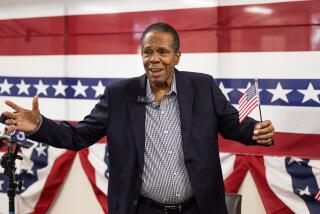Carew Makes Poignant Plea for Medical Funding
- Share via
WASHINGTON — Hoping to put a “human face” on his plea for more federal funding of medical research, baseball Hall of Famer Rod Carew told a Senate panel the story of his 18-year-old daughter, Michelle, who died this year of leukemia.
“Each year, pediatric cancer ‘drafts’ more children into a war than any other major condition or disease. For some, there are survivors. For others like Michelle, they are sent to a war they cannot win,” Carew testified during a hearing on Capitol Hill.
Michelle Carew, a graduate of Canyon High School in Anaheim Hills, died in April after a seven-month battle with the blood disease. Carew’s poignant story of his daughter and the videotape of her he presented at the hearing caused an outpouring of testimony by some senators who also have been touched by the disease.
Sen. David Pryor (D-Ark.) spoke of his son’s recent operation to remove a malignant tumor from his Achilles’ tendon; Sen. Connie Mack (R-Fla.) told of his wife’s experience with breast cancer and of losing a 39-year-old brother to the disease.
The hearing, sponsored by the Senate Appropriations and Senate Select Committee on Aging, was held to gather testimony on federal spending on medical research.
Sen. William S. Cohen (R-Me.), chairman of the Aging Committee, called for the creation of a national research trust fund to supplement the federal dollars now set aside for the National Institutes of Health. “Annual appropriations cannot be the sole line of defense,” he said.
The National Institutes of Health, which sponsors most of the federally funded medical research, has an annual budget of $12 billion, testified Mary Woolley, president of Research! America, a nonprofit group that advocates federal dollars for medical research.
“To put this $12-billion figure into perspective, we spend about $14 billion per year on cut flowers and twice that much, $28 billion, on major household appliances,” Woolley said.
Carew offered another, more personal perspective.
He told the senators that the medical bills for his daughter, who was hospitalized at Children’s Hospital of Orange County, totaled almost $3 million.
“Multiply Michelle’s medical expenses by thousands of patients, and you can see the enormous financial burden this disease puts on the hard-working American taxpayer,” Carew said.
He noted that of the millions of dollars spent each year on cancer research, pediatric cancer grants receive only a fraction.
“I’m here today on behalf of Michelle and all the others like her with life-threatening diseases who continue to fight to live fruitful lives,” Carew added.
He also recounted the awareness Michelle’s plight brought to the issue of bone marrow donations. The usually taciturn former ball player waged a public awareness campaign that caused an increase in the national donor rolls, from 1.5 million last year to nearly 2 million this year.
Also testifying in support of more spending on medical research was retired Gen. Norman Schwarzkopf, a former prostate cancer patient, and researchers in the fields of medicine and aging.
Cohen said attention needed to be paid to the expanding elderly population. By the year 2025, 1 of 5 Americans will be over age 65, he added.
“We battle over where and what to cut in Medicare and Medicaid just to stay afloat. But we are turning our backs to the tidal wave of an aging population that will drown us under the sheer force of its health care costs,” Cohen said.
More to Read
Get the L.A. Times Politics newsletter
Deeply reported insights into legislation, politics and policy from Sacramento, Washington and beyond. In your inbox twice per week.
You may occasionally receive promotional content from the Los Angeles Times.










